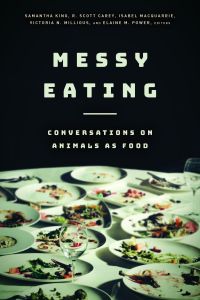Allergic Intimacies
Food, Disability, Desire, and Risk

This book can be opened with

The first book to explore food allergies in the United States from the perspective of disability and race
Are food allergies disabilities? What structures and systems ensure the survival of some with food allergies and not others? Allergic Intimacies is a groundbreaking critical engagement with food allergies in their cultural representations, advocacy, law, and stories about personal experiences from a disability studies perspective. Author Michael Gill questions the predominantly individualized medical approaches to food allergies, pointing out that these approaches are particularly problematic where allergy testing and treatments are expensive, inconsistent, and inaccessible for many people of color.
This thought-provoking book explores the multiple meanings of food allergies and eating in the United States, demonstrating how much more is at stake than we realize, at a critical time when food allergies are on the rise: An estimated 32 million Americans, including one in thirteen children, have food allergies. Diagnoses of food allergies in children have increased by 50 percent since 1997. Yet as the author makes clear, the whiteness of the food allergy community and single-identity disability theory is inherently limiting and insufficient to address the complex choices that those with food allergies make. Gill argues that racism and ableism create unique precarity for disabled people of color that food allergic communities are only beginning to address. There is a huge disparity in access to testing and treatment, with African American and Latinx children having higher risk of adverse outcomes than white children, including more rates of anaphylaxis. Food allergy professionals have a responsibility to move beyond individualized approaches to more robust coalitional efforts grounded in disability and racial justice to undo these patterns of exclusion.
Allergic Intimacies celebrates the various creative ways food allergic communities are challenging historical and current practice of exclusion, while identifying the depth of work that still needs to be done to shift focus from a white allergic experience toward a more representative understanding of the racial, ethnic, religious, and economic diversity of those in the United States. Gill’s book is a discerning and vital exploration of the key debates about risks, dangers, safety, representations, and political concerns affecting the lives of individuals with food allergies.
Quite possibly the first of its kind, Allergic Intimacies is a thorough and incisive cultural exploration of how we need to think about allergies via a disability studies framework. Part of the acuity of Michael Gill’s Allergic Intimacies is that it reminds us why we so urgently need this kind of analysis to better understand food-related allergies. In light of the current contemporary public health global pandemic, there is an even greater urgency to foreground how food studies and disability studies think, not just about Covid-19, but also about health issues that affect immune-compromised people. Gill’s book is a cultural history of food allergies, but it is also so much more than that.—Anita Mannur, Professor of English, Miami University, and author of Intimate Eating: Racialized Spaces and Radical Futures.
Allergic Intimacies offers a queer crip analysis of food allergies, revealing their fundamentally relational and temporal dimensions. Blurring the boundaries between individuals, their immune systems, and their desires, Gill argues for interdependence and solidarity across allergies and dietary needs.—Alison Kafer, University of Texas at Austin
Gill’s Allergic Intimacies is a unique contribution to the social science and humanities literature on food allergy in form and in content.—H-Net Reviews
Preface | ix
Introduction: Why Food Allergies? | 1
1 Relational Food Allergy, Immunity, and Environments | 25
2 Nut-Free Squirrels and Princesses with Peanut Allergies:
Food Allergies, Identity, and Children’s Books | 43
3 Allergic Reactions through Fluid Exchanges | 56
4 You Ate What? Intentionality, Accidents, and Death | 77
Conclusion: Pandemics and the Need for Coalitions | 97
Acknowledgments | 101
Notes | 103
Index | 123




